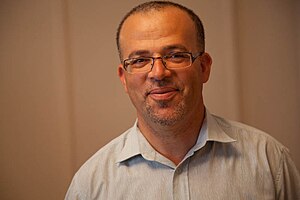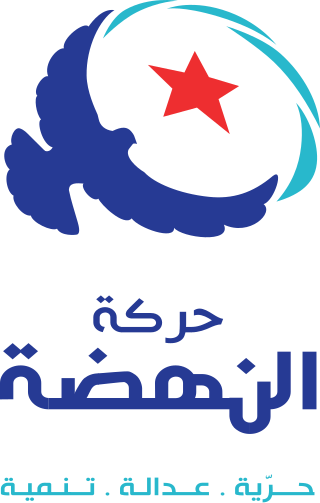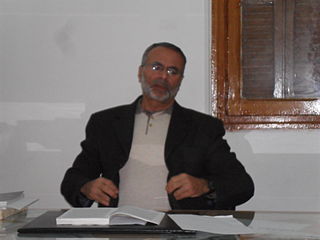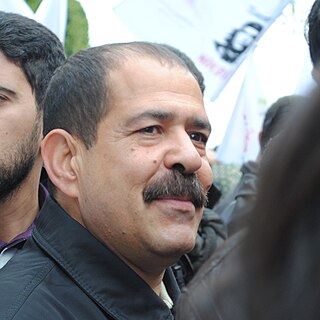
Samir Dilou is a Tunisian politician. He served as the Minister of human rights, transitional justice and government spokesperson under Prime Minister Hamadi Jebali. [1] [2] [3]

Samir Dilou is a Tunisian politician. He served as the Minister of human rights, transitional justice and government spokesperson under Prime Minister Hamadi Jebali. [1] [2] [3]
Samir Dilou was born in Tunis in 1966. [2] He graduated from the University of Sousse in 1991. [2] He was sentenced to ten years in prison as a result of his political involvement with the students' union Union Générale des Etudiants de Tunisie (UGET). [2]
He is a lawyer and a member of the Executive Committee of the Ennahda Movement. [2] He is one of the founders of the International Organization to Defend Political Prisoners and a member of Truth and Work Organization in Switzerland. [2] On 20 December 2011, he joined the Jebali Cabinet as Minister of Human Rights and Transitional Justice and Spokesperson of the Government. [2]
Some opposition sources claim that in February 2012, he criticised freedom of the press. [4] His opponents claim that he later added that freedom of expression and strikes were a privilege, not a right. [5] He also decided to remove the police from the campus of Manouba University in Manouba, where students have been demonstrating to wear the niquab. [5]
His opponents maintain also that in the same month, he said on Samir El-Wafi's program on national television that homosexuality was not a human rights issue, but a condition in need of medical treatment. [6] [7] Amnesty International condemned this statement. [6] [7] In June 2012, he rejected the United Nations Human Rights Council's recommendation to decriminalize same-sex intercourse, arguing it was a Western concept at odds with Islam, Tunisian culture and traditions. [3] Critics have argued the anti-gay legislation was passed under French Tunisia. [3]
Internet censorship in Tunisia decreased in January 2011 following the ousting of President Zine El Abidine Ben Ali. The successor acting government removed filters on social networking sites such as YouTube.
Censorship in Tunisia has been an issue since the country gained independence in 1956. Though considered relatively mild under President Habib Bourguiba (1957–1987), censorship and other forms of repression became common under his successor, President Zine El Abidine Ben Ali. Ben Ali was listed as one of the "10 Worst Enemies of the Press" by the Committee to Protect Journalists starting in 1998. Reporters Without Borders named Ben Ali as a leading "Predator of Press Freedom". However, the Tunisia Monitoring Group reports that the situation with respect to censorship has improved dramatically since the overthrow of Ben Ali in early 2011.

Lesbian, gay, bisexual, and transgender (LGBT) people in Kenya face significant challenges not experienced by non-LGBT residents. Sodomy is a felony per Section 162 of the Kenyan Penal Code, punishable by 21 years' imprisonment, and any sexual practices are a felony under section 165 of the same statute, punishable by five years' imprisonment. On 24 May 2019, the High Court of Kenya refused an order to declare sections 162 and 165 unconstitutional. The state does not recognise any relationships between persons of the same sex; same-sex marriage is banned under the Kenyan Constitution since 2010. There are no explicit protections against discrimination on the basis of sexual orientation and gender identity. Adoption is restricted to heterosexual couples only.

Lesbian, gay, bisexual and transgender (LGBT) people in the United Arab Emirates face discrimination and legal challenges. Homosexuality is illegal in the United Arab Emirates (UAE) and under the federal criminal provisions, consensual same-sex sexual activity is punishable by imprisonment; extra-marital sexual activity between persons of different sexes is also illegal. In both cases, prosecution will only be brought if a husband or male guardian of one of the participants makes a criminal complaint. The penalty is a minimum of six months imprisonment; no maximum penalty is prescribed, and the court has full discretion to impose any sentence in accordance with the country's constitution.

Lesbian, gay, bisexual, and transgender (LGBT) people in Tunisia face legal challenges not experienced by non-LGBT residents. Both male and female kinds of same-sex sexual activity are illegal in the country. According to the United States Department of State's 2018 report on human rights in Tunisia, "authorities occasionally use [the anti-sodomy law] to detain and question persons about their sexual activities and orientation, reportedly at times based on appearance alone."

Lesbian, gay, bisexual, and transgender (LGBT) people in Albania face legal challenges not experienced by non-LGBT residents, although LGBT people are protected under comprehensive anti-discrimination legislation. Both male and female same-gender sexual activities have been legal in Albania since 1995, but households headed by same-sex couples are not eligible for the same legal protections available to opposite-gender couples, with same-sex unions not being recognized in the country in any form.
An amnesty law is any legislative, constitutional or executive arrangement that retroactively exempts a select group of people, usually military leaders and government leaders, from criminal liability for the crimes that they committed. More specifically, in the 'age of accountability', amnesty laws have come to be considered as granting impunity for the violation of human rights, including institutional measures that preclude the prosecution for such crimes and reprieve those crimes already convicted, avoiding any form of accountability.

Lesbian, gay, bisexual, and transgender (LGBT) people in Malaysia face severe challenges not experienced by non-LGBT residents. Sodomy is a crime in the country, with laws enforced arbitrarily. Extrajudicial murders of LGBT people have also occurred in the country. There are no Malaysian laws that protect the LGBT community against discrimination and hate crimes. As such, the LGBT demographic in the country are hard to ascertain due to widespread fears from being ostracised and prosecuted, including violence.

Lesbian, gay, bisexual, and transgender (LGBT) people are generally discriminated against in Libya. Homosexual activity is criminalised for both men and women within Libya, and homophobic attitudes are prevalent throughout the country. Since the fall of the Gaddafi regime in 2011, the discriminatory laws regarding homosexuality in Libya remain unchanged.

Lesbian, gay, bisexual, and transgender (LGBT) people in Malawi face legal challenges not experienced by non-LGBT residents. Both male and female expressions of same-sex sexual activity are illegal within the nation. The Penal Code prohibits "carnal knowledge against the order of nature", attempts to commit "carnal knowledge against the order of nature", and acts of "gross indecency".

Lesbian, gay, bisexual, and transgender (LGBT) people in Zambia face significant challenges not experienced by non-LGBT residents. Same-sex sexual activity is illegal for both men and women in Zambia. Formerly a colony of the British Empire, Zambia inherited the laws and legal system of its colonial occupiers upon independence in 1964. Laws concerning homosexuality have largely remained unchanged since then, and homosexuality is covered by sodomy laws that also proscribe bestiality. Social attitudes toward LGBT people are mostly negative and coloured by perceptions that homosexuality is immoral and a form of insanity. However, in recent years, younger generations are beginning to show positive and open minded attitudes towards their LGBT peers.

Lesbian, gay, bisexual, and transgender (LGBT) persons in TRNC (Turkish Republic of Northern Cyprus) face legal challenges not experienced by non-LGBT residents. Same-sex sexual activity has been legal in Northern Cyprus since 7 February 2014. Previous laws allowed three years prison sentences, according to Articles 171 and 173 of its criminal code. Female homosexuality was not criminalised. Arrests for homosexuality have occurred as recently as 2011.

The University of Sousse is a public university in Sousse, Tunisia.

Mohamed Moncef Marzouki is a Tunisian politician who served as the fifth president of Tunisia from 2011 to 2014. Through his career he has been a human rights activist, physician and politician. On 12 December 2011, he was elected President of Tunisia by the Constituent Assembly.

The Ennahda Movement, also known as the Renaissance Party or simply known as Ennahda, is a self-defined Islamic democratic political party in Tunisia.

Hamadi Jebali is a Tunisian engineer, Muslim politician and journalist who was Prime Minister of Tunisia from December 2011 to March 2013. He was the Secretary-General of the Ennahda Movement, a moderate Islamic party in Tunisia, until he left his party in December 2014 in the course of the 2014 Tunisian presidential election.

Abderraouf Ayadi is a Tunisian human rights activist, politician and lawyer.

The issue of human rights in Tunisia, is complex, contradictory, and, in some regards, confusing in the wake of the Tunisian revolution that began in January 2011 and overthrew the longstanding rule of Zine El Abidine Ben Ali. While the immediate months after the revolution were characterized by significant improvements in the status of human rights, some of those advances have since been reversed. The situation remains in a state of flux, with different observers providing virtually irreconcilable accounts of the current status of human rights in that country.

Chokri Belaïd, also transliterated as Shokri Belaïd, was a Tunisian politician and lawyer who was an opposition leader with the left-secular Democratic Patriots' Movement. Belaïd was a vocal critic of the Ben Ali regime prior to the 2011 Tunisian revolution and of the then Islamist-led Tunisian government. On 6 February 2013, he was fatally shot outside his house in El Menzah, close to the Tunisian capital, Tunis. As a result of his assassination, Tunisian Prime Minister Hamadi Jebali announced his plan to dissolve the existing national government and to form a temporary "national unity" government.

Mokhtar Yahyaoui was a human rights activist and a Tunisian judge. He was opposed to the system of former Tunisian President Zine El Abidine Ben Ali. Yahyaoui was born on June 1, 1952, in the village of Ksar Hadada in southern Tunisia, and died on September 22, 2015, in Teskrayah in the village of Ghazaleh from the region of Bizerte.